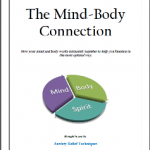Symptoms of Major Depression
Depression is a very mental health disorder that can happen to anyone regardless of age, gender, occupation, race or religion.

Major Depressive Disorder (MDD), is a mental health disorder, which is characterized by at least two weeks of low mood that is present across most situations. It is often accompanied by low self-esteem, loss of interest in normally enjoyable activities, low energy, and pain without a clear cause. Source
While it is perfectly normal to feel somewhat down from time to time, there is no question that you have to see a doctor as soon as you start experiencing major depression symptoms, especially when there is no apparent reason to be depressed in the first place.
One of the biggest problems with this disorder is that the person who is depressed doesn’t even realize it — it’s his frequent companions who notice the changes and they may even suffer more because of the effects of the condition.
For this reason, the friends or family members should be prepared to help the individual seek the right treatment.
Look For The Signs As Listed Below
You should first be able to identify the disorder by watching out for certain major depression symptoms.
WebMD describes the symptoms as follows:
- Fatigue or loss of energy almost every day.
- Feelings of worthlessness or guilt almost every day.
- Impaired concentration, indecisiveness.
- Insomnia or hypersomnia (excessive sleeping) almost every day.
- Markedly diminished interest or pleasure in almost all activities nearly every day (called anhedonia, this symptom can be indicated by reports from significant others).
- Restlessness or feeling slowed down.
- Recurring thoughts of death or suicide.
- Significant weight loss or gain (a change of more than 5% of body weight in a month).
The first thing people need to understand about depression is that it’s not some kind of life-threatening condition or something that one should be ashamed of. In fact, it is a fairly common disorder that affects millions of men, women and children around the world. With the right treatment, it can be fully treated and managed.
Almost twice as many women as men have major or clinical depression; hormonal changes during puberty, menstruation, pregnancy, miscarriage, and menopause, may increase the risk.
Other factors that boost the risk of clinical depression in women who are biologically vulnerable to it include increased stress at home or at work, balancing family life with career, and caring for an aging parent. Raising a child alone will also increase the risk. Source.
The most common major depression symptom is when the individual withdraws into himself and refuses to interact with other people. Needless to say, this kind of behavior will not only affect the individual but the people around him as well.
Three Categories of Depression
Depression can be classified into three different categories:
- Bipolar depression disorder
- Dysthymia – Dysthmic disorder is a chronic form of depression and
- Clinical depression – Also known as ‘Major Depression’.
Of these three categories, clinical depression is considered to be the most severe and comes with the most noticeable symptoms.
The causes of major depression may vary but some of the most common triggers include recent traumatic events or a series of negative experiences in a person’s life, which may have happened recently or even in childhood.
When left untreated, major depression will gradually disrupt a person’s life. They will be unable to go to work or even perform his routine duties at home. Subsequently, the disorder can take its toll on a person’s finances and relationships with other people.
The key to treating depression is to be able to identify the signs as early as possible and get immediate treatment for the disorder. Therefore it is important for you to recognize the signs and advise your health care professional.
Some of these major depression symptoms that we should all look out for are insomnia, unexplained crying, sudden weight loss or weight gain, lack of sexual drive and constant fatigue. Unfortunately these symptoms can relate to many disorders, but when a person is ‘feeling the blues’ constantly and exhibiting similar signs, then its time to delve a little deeper.
Affiliate Disclosure
My website contains affiliate links, which means if you purchase any products mentioned in my articles, I may receive a commission. If you do, thank you!






Speak Your Mind